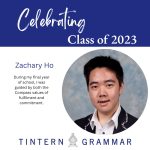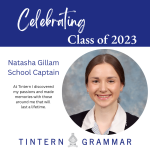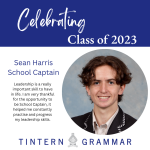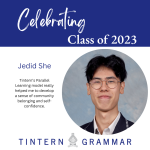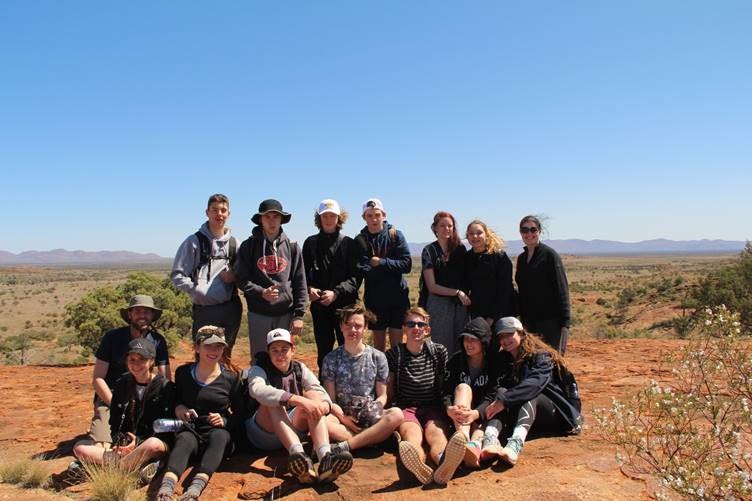
Personal Challenges and safe ‘risk taking’– what do we do to help?
Personal challenges exist in everyday life for all of us. They may take the form of an uncomfortable meeting, performance of a difficult task or, for some, just managing to get out of bed in the morning.
Tintern seeks to provide challenges for our students through a myriad of experiences which extend our students to take risks. Risk-taking behaviour is part of normal youth development. It can help a young person build confidence and strengthen decision-making skills. A feature of our program is the offering of Outdoor Education camps for students in Years 3-12.
‘I thought camp was excellent – I didn’t want to leave.’
‘It was a fantastic week. I learnt a lot and had heaps of fun.’
‘Amazing! Awesome! Canberra is a most beautiful place.’
These spontaneous comments from our Year 6 girls illustrate the delight and positive responses following the annual camp in Canberra in May.
This unique experience for our students is a highlight of the sequential Outdoor Education program operating in the Junior Schools and Secondary School. Beginning at Year 3, the camps are designed to provide challenges for personal growth and development for all students in an enjoyable environment.
These challenges can be extended to students taking part in the overseas trips and tours program.
The recent Tintern trip to China offered a unique experience to Senior College students. We had a large number of interested students and ended up taking 35, a much larger group than anticipated.
The leadership of the teachers was exceptional, given the changed conditions at tourist sites in China. Nowadays, with more and more Chinese tourists travelling, sites are packed, and student safety and comfort was paramount in the minds of teachers. Australian students are not used to moving through crowds of this nature and it was often a challenge to ensure that none of them strayed away from the group due to lack of attention to what was happening around them.
From the students’ and parents’ point of view, the trip was an overwhelming success. Students were transported safely through a range of challenging transport venues (particularly Beijing Railway Station) and through five different cities. Tour guides were informative and personable, and an overall high level of student health was maintained. Students were looked after by their teachers with genuine care and professionalism, and the students certainly appreciated their efforts.
Last year upper senior students also enjoyed a trip to the Central Australia. Uluru and Kata Tjuta was an excellent way to begin the tour; spectacular rock formations and landscape provided opportunities for photography students and cultural appreciation of the Aboriginal people’s sacred sites. Cave Hill was well worth the long drive; the Aboriginal guide was fantastic and the cave paintings a very special experience.
The students loved the Hermansberg Primary school experience and engaged thoughtfully with the aboriginal students. This was a must-do activity. The school was a mental challenge. It was a truly amazing school, not only the way it’s run and the kids that were in it, but the quality of the staff and the Principal as well.
‘What really touched me was towards the end of the school day when the bigger kids came out to kick the footy and I found myself the only white kid standing around 10 Indigenous kids. Now that was really special. For the very first time in my life I was the minority race. Not only was it confronting in a sense of feeling, it was a moment of reflection of what it must be like for them when they go to schools where white people are the ‘dominant’ skin colour. All in all the trek taught us about the cultures, beauty, fun, ugliness and harshness of the outback, from the wide scrub plains to the jagged edges of the MacDonnell Ranges. It really did take us on a trek.’
Another trip which 24 students took part in at the end of 2016 was the World Challenge trip to India.
A strength of this trip is that the expedition enables the students to develop ‘21st Century’ life skills in real life scenarios. Within the framework of a basic itinerary put together by World Challenge, they are able to take control of the trip and work together to successfully navigate their way around a foreign country. Through taking on the various roles within the group, not only are they learning practical skills such as budgeting and navigating, they are also learning the importance of values such as compassion, respect, independence and responsibility.
World Challenge provides a program that is very professional and enables the school staff members to feel supported in every aspect of the journey, both leading up to the expedition and throughout the expedition. Both staff and students were able to enjoy the benefits of an organisation that values safety and ensures that they will have a once in a lifetime experience.
‘World Challenge was an unbelievable experience where I was able to learn about a new country and experience travelling independently. The people we met and the places we saw were all unforgettable.’
‘The trip to us meant opening our eyes to other experiences out of our comfort zone, taking on more responsibility and putting others needs before our own. We will never forget this trip; we are thankful for the chance to take part in it.’
‘World Challenge was one of the best experiences of my life; I met so many new people and experienced a very diverse and exciting culture at the same time.’
There is also no doubt that staff enjoy the opportunities to co-ordinate a school tour that is potentially ‘life-changing’ for the students. The teaching staff work very hard to ensure that all necessary planning procedures are in place. As a result, the activities for the students are meaningful, well prepared and importantly, a lot of fun.
Contrary to popular belief, risk-taking behaviour can be healthy and help young people thrive. Many adults think of risk as a bad thing. Fortunately, many positive risks can fulfil a young person’s need for thrill in a healthy way. As a parent, mentor or influential adult you can encourage or engage youth in these healthy activities.
by Anna Riddell, Head of Girls’ Junior School and Early Learning Centre and Tintern Grammar Trips and Tours Co-ordinator

